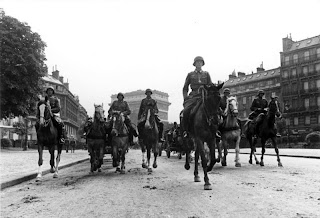 |
| German soldiers enter Paris. Photo sourced from WikiCommons. |
By the middle of June 1940 the Germans had the Allies on the ropes. The British Expeditionary Force had evacuated from Dunkirk, the best French army units had already been encircled, and the government had abandoned Paris. The city was squarely in Germany's sights.
Earlier in the war, Warsaw, the capital of Poland, and Rotterdam, a major city in the Netherlands, had both been severely bombed by the German Luftwaffe. The remaining city officials in Paris did not want to have their city share Warsaw's fate, and so on June 10 they declared Paris an open city, allowing the Germans to march in unopposed, an opportunity which the German propaganda artists (as well as Hitler, as described by his chief architect Albert Speer) took full advantage of.
Even when the Allies landed on Normandy and began pushing inland,, the Germans did not want to have bombs drop on Paris, so they moved their forces out of the city in 1944, leaving the city virtually unscathed throughout the war. These decisions have left us with a beautiful city to go to and enjoy for all its worth. Until next time take care, and thanks for reading.
(Facts and figures sourced from "World War II" by H.P Willmott, Robin Cross, and Charles Messenger.)
No comments:
Post a Comment